Pregnant women benefit from life-saving drug

Expectant mothers wait to be attended to during an antenatal visit. Most maternal deaths occur because of lack of skilled attendance at birth. File photo
What you need to know:
Like Mutonyi, many pregnant women who do not have access to health facilities risk their lives to deliver from home every day. Many end up with complications including suffering excessive bleeding that sometimes results in death.
Four days after giving birth, Sarah Mutonyi chats with a researcher outside her house in Mbale District. She is explaining how her birth was without any incidence.
Mutonyi was working in her banana plantation, accompanied by her five-year-old son when she went into labour.
Unable to make the journey to the health facility, she gave birth from a nearby banana planation, with the help of her mother-in-law.
Like Mutonyi, many pregnant women who do not have access to health facilities risk their lives to deliver from home every day. Many end up with complications including suffering excessive bleeding that sometimes results in death.
It is for this reason that Dr James Ditai, from Sanyu Africa Research Institute, has been spearheading and promoting the use of misoprostol, a drug that can control bleeding during labour.
“After witnessing a mother die from over-bleeding at the hands of a traditional birth attendant, I started this research to study how the self-administered misoprostol could prevent bleeding,” said Dr Ditai.
Unskilled deliveries
He notes that in rural eastern Uganda, about 43 per cent of women deliver outside health facilities.
Dr Ditai teamed up with a group of researchers from the University of Liverpool, Gynuity Health Project and Makerere University to establish the effect of misoprostol tablet, if given to pregnant women immediately after giving birth.
According to Dr Ditai, selected women who were in their 34th week of pregnancy were recruited from three health facilities, including two rural centres and one referral hospital.
Those who received the drugs and yet delivered from home were found not to have experienced normal bleeding. The women were given the tablets and a manual containing instructions on how to use the drug.
Dr Anthony Mbonye, the director of clinical services at the Ministry of Health, who was speaking at the launch of the results at Mbale Regional Referral Hospital, said the initiative is one way of reducing the high numbers of maternal deaths that still occur in the country.




